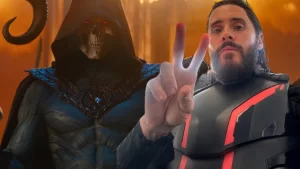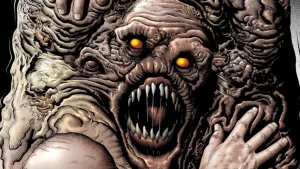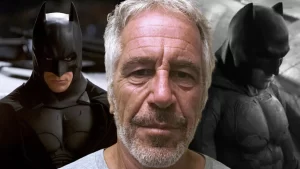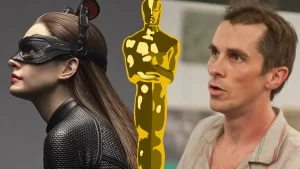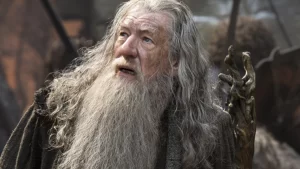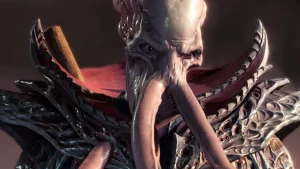The Game’s a Foot!
A Film Review of Sherlock Holmes: A Game of Shadows
By: Lawrence Napoli
Who doesn’t love a good mystery? It is a question that reveals mankind’s innate curiosity with the unknown or unfamiliar in order to identify the variables and explain the inexplicable so as to allow ourselves to be comfortable in our own environment. Sherlock Holmes, the definitive, master, gentleman detective is a character that is plagued by a hypersensitivity to that which is and naturally drawn to any scenario that is simply put, undefined. Ever the avenging agent of order, Holmes’ fiction involves the solving of many a mystery which leads to the incarceration of several citizens of ill repute, yet no individual ever seemed to stand a proper challenge. The mystery itself was always Holmes’ true foil as it seemed no less than a cabal of criminals was required to stump old Shirley for more than an hour. This was the Sherlock Holmes that graced the silver screen in Guy Ritchie’s first adaptation in 2009. The sequel: A Game of Shadows, presents a much more personal confrontation for Holmes as the audience is introduced to Professor James Moriarty who is every bit an intellectual equal, yet far less of a gentleman who isn’t concerned with collateral damage and harming the innocent in order to get whatever he wants. As such, Holmes must approach this new investigation in a different manner which, of course, translates into a slightly different movie-going experience which happens to place a heavy emphasis on action.
One of the major strengths to these Guy Ritchie adaptations has been the writing: both dialogue and the overall plot. This continues to be the case for the most part in A Game of Shadows, but I was extremely surprised to find out that no member of the original (and rather large) writing team returned to pen the sequel. Relative writing novices Michele and Kieran Mulroney are responsible for this script which is usually a tell tale sign of a film franchise taking a turn for the worse. Thankfully, the writers were up to the task of measuring up to the success of the original. Any scenario involving Holmes’ arch nemesis must be compelling and complicated without being totally convulsive. GoS certainly has several interesting plot elements in place such as more dynamic settings and the introduction of several new characters, but when the film ends the viewer finds him or herself with a somewhat predictable story. Anyone who has seen The League of Extraordinary Gentlemen (2003) will notice some carbon copying at work. The story attempts to compensate by adding more action sequences than the first film. Although these scenes were well shot and certainly added to the pacing, it seemed to snowball at times and despite the fact that Sherlock Holmes is known to be an apt combatant, I never got the impression he was Neo from The Matrix. The witty banter between Holmes and Watson is a perfect evolution of the relationship established in the first film. This hilarious dialogue keeps the over-indulgent action grounded by dialing back on the intensity without losing the audience’s attention. I was particularly satisfied with the genuine, plutonic love demonstrated between Holmes and Watson which could not have been more perfectly depicted than the very last scene in the film.
As for the action in A Game of Shadows, wow, I could use a LOT less slow motion effects please. Those of you who may believe I exaggerate with my Matrix reference, rest assured that this comment is right on the mark. I cannot fault Guy Ritchie entirely for this because I understand the need to keep the visual style to his films memorable, but sometimes too much when it comes to visual effects sacrifices the effectiveness of the action in the first place. Please see the Star Wars prequels in reference to that comment. It remains to be seen if the global audience will fully accept Sherlock Holmes as an action franchise, but to fully sell out the story in this regard would be a mistake. Holmes’ story revolves around the investigation of a mystery and when half of a feature length film is devoted to explosions, fisticuffs and gunplay, that mystery doesn’t have as much screen time to shine. Too many dialogue driven scenes in sequence do have the potential of overburdening an audience with too much exposition and breaking those up with action is an effective way to avoid that result. Good old fashioned choreography and framing can still produce effective balance to the pacing without running the risk of diluting the impact of repeated digital effects. Please take note, Mr. Ritchie.
Top marks to all of the acting performances in A Game of Shadows. The individual efforts of the supporting cast are the kind one would expect from actors promised much more screen time and/or prominent roles. Noomi Rapace as Madam Heron, Stephen Fry as Mycroft Holmes, Rachael McAdams as Irene Adler, Geraldine James as Mrs. Hudson and Eddie Marsan as Inspector Lestrade all show that even an actor that embraces a small role can have a significant impact on the overall quality of a film. Stephen Fry stood out in particular because no one in their right mind would ever accept the possibility that he and Robert Downey Jr. could be related in any way if they were to simply stand next to each other. Fry’s snobbish line delivery and nuances in dialect play off perfectly from Downey’s and the repartee between them makes for an undeniable connection that pays off every time the two share screen time.
A good villain is invaluable to any film and Jared Harris’ portrayal of Moriarty may not be one for the ages, but is very respectable and doesn’t back down to Robert Downey Jr. in any way. Harris has a keen ability to counter every verbal jab Downey throws which is essential for his character. Although he also demonstarates the proper demeanor of calm, control and supreme confidence, I didn’t feel he was as menacing as the faceless entity this character was portrayed as in the first film. Perhaps this is the way Moriarty is written in the Sherlock Holmes novels, but as a fan of film, I would like to see a little bit more pure evil.
In the end, this film is all about Robert Downey Jr. as Sherlock Holmes and Jude Law as Dr. Watson and although these two characters are featured less as a duo and promotes the interplay between Holmes and Moriarty as a higher priority, these two actors once again deliver performances that should not be missed by anyone. The key relationship between their characters is far more than the prototypical funny man vs. straight man routine as both have individual moments of hilarity and poignancy. Their friendship is far beyond a simple “bro-mance” as the audience is able to feel the sense of true family between them. Law and Downey remain the essential components to these Sherlock Holmes films and despite the arching narrative’s tendency to move these characters apart, it is essential for these films to see them stay together.
Not to take anything away from Jude Law (because he is a fine actor and clearly does a fine job in this film), but Robert Downey Jr. ought to be recognized as a great actor for the vast array of fine performances he continues to add to with his efforts in A Game of Shadows. The argument could be made that the difference between Tony Stark and Sherlock Holmes is merely an English accent, but the fact is that these are two very different types of “train wreck characters” that exude similar charisma in very different ways and it takes more than a great performance to communicate this; it takes a great actor. All Downey needs is a custom built drama with nothing but Oscar gold in mind to definitively place him alongside the all time greats.
Sherlock Holmes: A Game of Shadows is not a perfect film, but is easily the best action/adventure feature during this holiday season. Families that have teenage children will have a very fun time, but be forewarned, the English dialect throughout is very thick so those who are befuddled by the likes of Harry Potter may find themselves asking “What did he just say?” once too often. This film is an action-buddy-comedy mixed with a period piece with brains and if that doesn’t appeal to you, I’d recommend Justin Bieber’s self congratulatory Never Say Never or a new classic like American Idol’s notorious flop From Justin to Kelly. In this season of giving, even bad films need to have paying viewers. Otherwise, bad films would never be made . . . wait a minute!


